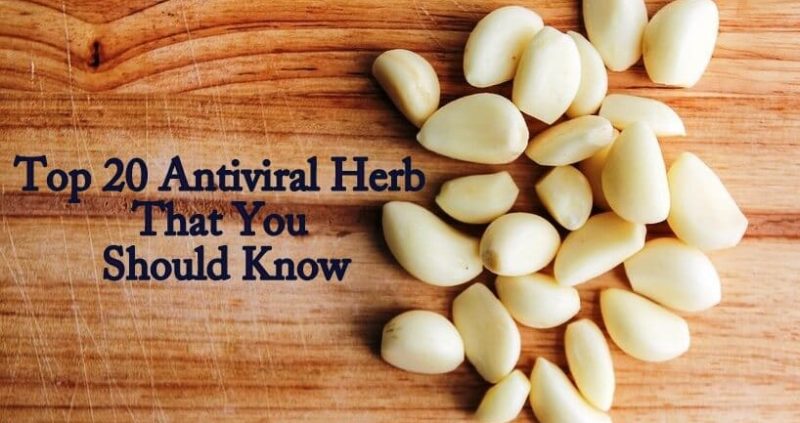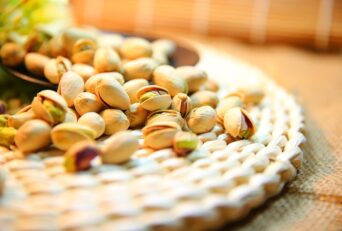Did you know that there are more than 400 different viruses that can cause infections, including the common cold, the flu, hepatitis, mononucleosis, and HIV?
To deal with these virus, the most powerful weapon is antiviral herbs that boost the immune system, reduce inflammation and fight infections.
When we talk about herb the first thing that pops up in our mind is “Natural”, yes it is true. The natural way is considered to be the best cure. Herbal remedies are comparatively cheap and accessible.
Generally, antiviral herbs inhibit the development of the virus. They can be used to treat infections without caution because they’re harmless and typically cause no or few side effects.
Many antiviral herbs boost the immune system, which allows the body to attack viral pathogens. This can be even better than attacking specific pathogens, which antiviral drugs are designed to do because pathogens mutate over time and become less susceptible to treatment.
Not only do antiviral herbs fight viral infections, boost the immune system and work as flu natural remedies, but they have a number of other health benefits, such as cardiovascular, digestive and support. There are a considerable number of antiviral herbs. This article deals with few of them.
Table of Contents
Top 20 Antiviral Herbs
1. Elderberry

Elderberry is one of the oldest natural herbs. It has a long, rich history of use for medicinal benefits by numerous cultures.
It fights infections including influenza, herpes, viral infections and bacterial infections. A study published in the Journal of Alternative and Complementary Medicine concluded that elderberry can be used as a safe treatment for influenza A and B.
This is due to its efficiency on all strains of influenza virus that were tested, the clinical results, its low cost and the absence of side effects.
It is elderberry’s ability to enhance immune response with higher levels of antibodies in the blood. It is believed to inhibit a virus’s ability to penetrate healthy cells and protect cells with powerful antioxidants.
Elderberry has also been shown to inhibit replication in four strains of herpes viruses and reduce the non-effectivity of HIV strains.
It is used as a remedy for viral infections like the flu and common cold. Elder stimulates the circulation, causing sweating, effectively cleansing the body.
Dosage
Elderberry syrup is the common delivery method, and 1-3 tablespoons can be taken per day during infection.
Leaves, roots, seeds, and berries of the raw plant contain cyanide-producing compounds should not be consumed without cooking properly.
Utmost, every part of the elderberry can be used — the flowers, bark, roots and leaves are often used for their amazing health benefits. So discover elderberry benefits for your health today.
2. Calendula

The flower petals of the calendula plant, which is sometimes called pot marigold, have been used for medicinal purposes since at least the 12th century.
This antiviral herb has high amounts of flavonoids, which are plant-based antioxidants that protect cells from being damaged by free radicals; it also fights viruses, inflammation, and bacteria.
The dried petals of the plant are used in tinctures, ointments and washes to treat infections, burns, wounds and heal cuts fast.
According to the University Of Maryland Medical Center, ear drops containing calendula are sometimes used to treat ear infections in children, and scientific studies have found no side effects.
3. Garlic

Garlic is antiviral, antifungal, and antibacterial. It is used as a folk remedy in many cultures to protect against colds and influenza.
Experiments have shown that garlic — or specific chemical compounds found in garlic — is highly effective at killing countless microorganisms responsible for some of the most common and rarest infections, including pneumonia, tuberculosis, thrush, and herpes.
Because of its antiviral properties, garlic can be used to treat eye infections and as a natural ear infection remedy.
It can reduce the risk of cancer, control hypertension, boost cardiovascular health and fight hair loss.
Dosage
You can take garlic in a tonic or if you can handle it, chew raw garlic. It not only will help fight the virus, but it will also help kill any secondary infections trying to take root.
4. Ginger
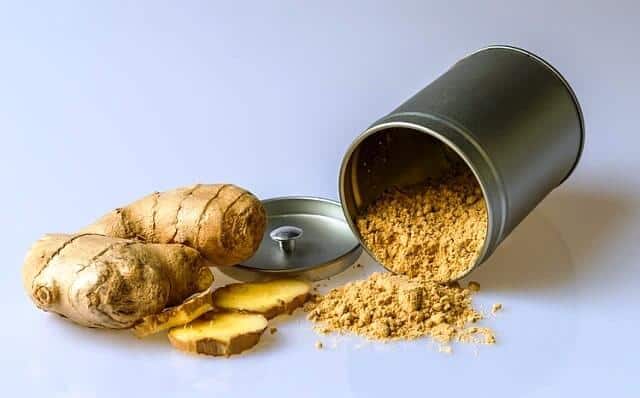
Ayurvedic medicine has praised ginger’s ability to boost the immune system before recorded history.
It believes that because ginger is so effective at warming the body, it can help break down the accumulation of toxins in your organs.
It’s also known to cleanse the lymphatic system, our body’s sewage system. Ginger prevents the accumulation of toxins that make you susceptible to viral, fungal and bacterial infections.
Medicinal ginger health benefits also include working as a natural remedy for nausea, pain alleviation, anti-inflammatory properties and improving diabetes.
Dosage
Ginger can be taken as a tea, in capsule form, or added to meals.
5. Green Tea

Currently, green tea is consumed at a large for weight loss. The only benefit of green tea isn’t weight loss it has several other benefits such as it inhibit viral infections by binding to the haemagglutinin of the influenza virus and so preventing the virus from entering the host cells.
Green tea (Camellia sinensis) has been considered as scientific methods have recently validated a medicinal remedy in Chinese tradition for over 4000 years and its many health benefits.
Dosage
The best way to consume green tea is as a tea.
6. Oregano

In addition to adding great flavour to food, oregano also protects against viruses and bacteria as one of the best antiviral herbs available. Oregano oil benefits are proving to be superior to some antibiotics, without the harmful side effects.
That’s because oregano contains two powerful compounds, carvacrol, and thymol, that have powerful antibacterial and antifungal properties.
It’s the carvacrol that reverses viral infections, as well as allergies, tumours, parasites and disease-causing inflammation.
Dosage
It can be taken in a capsule to promote healing.
Simple way: A pinch of oregano on the meal.
7. Olive Leaf

The olive leaf has antiviral properties, giving it the ability to treat the common cold and dangerous viruses, including candida symptoms, meningitis, pneumonia, chronic fatigue syndrome, hepatitis B, malaria, gonorrhoea, and tuberculosis; it also treats dental, ear and urinary tract infections and is a natural treatment for shingles.
Research shows that olive leaf extracts effectively fight against some disease-causing microbes, including some viruses that cause influenza and other respiratory infections.
The powerful compounds found in olive leaves destroy invading organisms and don’t allow viruses to replicate and cause an infection.
In fact, the olive leaf is so beneficial to our health that treatment with olive leaf extracts reversed many HIV-1 infection-associated changes in a study done at the New York University School of Medicine.
Dosage
Olive leaf can be taken as a tincture, capsule or tea mixed with mint. Avoid during pregnancy.
8. Licorice Root

Liquorice is emerging as a prominent player in the search for treatment and prevention of diseases like hepatitis C, HIV, and influenza. The Chinese Journal of Virology published a review that confirms the antiviral activity of liquorice root due to its triterpenoid content.
9. Cat’s Claw

Cat’s claw works as a natural arthritis remedy and treats ulcer symptoms as well.
The bark and root of cat’s claw have been used by South Americans for centuries to treat health problems including fevers, stomach ulcers, digestive conditions, and dysentery.
Cat’s claw has antiviral properties, and it’s used as a natural herpes cure. Early studies are researching its effects on HIV as well.
This powerful herb is also anti-inflammatory, antibacterial and antifungal. It’s used to treat digestive problems such as ulcers, irritable bowel syndrome, colitis, and leaky gut syndrome.
Dosage
The best way to consume cat’s claw regularly is by making an herbal tea with a tablespoon of the herb in eight ounces of water.
10. Astragalus Root
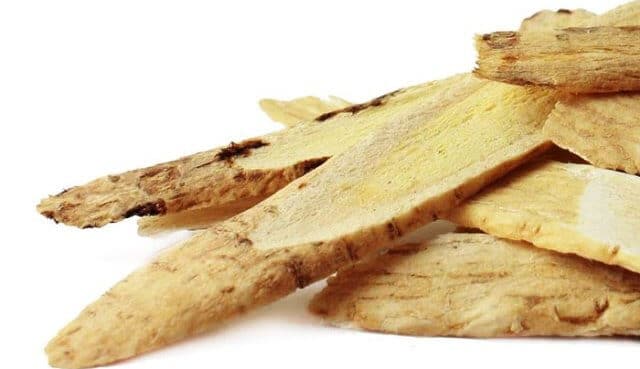
Astragalus Root, another powerful antiviral herb, has been used in traditional Chinese medicine for centuries, and its main use is to boost the body’s immune system.
Scientific studies have shown that astragalus has antiviral properties and stimulates the immune system, suggesting that it may help prevent the common cold or flu.
Astragalus also has antibacterial and anti-inflammatory properties, and it is used on the skin for wound care. It’s also one the seven adaptogen herbs to lower cortisol.
11. Echinacea

Echinacea has become one of the top-selling herbs of all time; that’s because regular use of echinacea is beneficial for immune support and overall health.
There is considerable evidence suggesting that phytochemicals in echinacea have the capacity to reduce virus infections and tumours.
This powerful herb contains a compound called echinacea that inhibits bacteria and viruses from penetrating healthy cells.
This greatly reduces the chances of contracting any type of infection while consuming Echinacea.
12. Cranberry

Cranberry is a potent defence against urinary tract infections due to its ability to make the bladder lining too “slippery” to adhere to.
Full of antioxidants, cranberry also has antiviral properties and prevents plaque formation on teeth.
Dosage
Cranberry can be taken in a capsule or as juice (make sure it is unsweetened).
13. Turmeric Extract
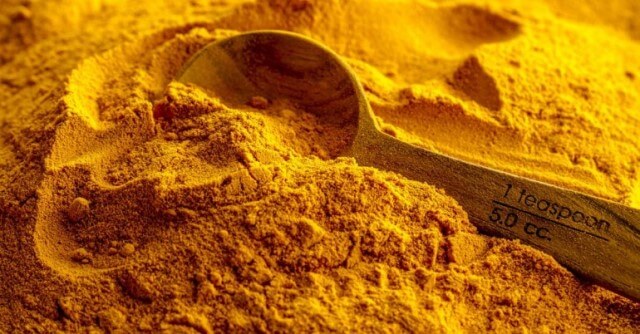
This herb has an amazing number of powerful properties, and its antiviral action is very helpful to assist you to get over colds and flu.
There are some other potent benefits of turmeric, and while it is known as an excellent herbal extract to aid the immune system during the cold and flu season, it has many other excellent effects to aid the body.
It is a powerful antioxidant and has anti-inflammatory, analgesic, antiviral, antibacterial and antimicrobial properties.
Dosage
If you have allergies, MCS or multiple chemical sensitivity, Turmeric extract has some extremely useful effects that make it a remedy that you would always want to have on hand. The easy way direct applies on face
14. Rhodiola Rosea

Rhodiola Rosea has a great number of helpful attributes that make it useful to benefit you, and it is particularly helpful to aid stress.
This is one of the antiviral herbs that is also one of the adaptogenic herbs.Adaptogens are a group of herbs that are known to be particularly helpful to aid stress, anxiety and fatigue.
Stress is so common is today’s fast paced world, that most people have experienced its effects at some time.The Rhodiola Rosea root is the part used to make remedies that are used to aid stress.
It is also an excellent remedy that is both an antidepressant and antioxidant, as well as being one of the more potent antiviral herbs.
It is one of the herbs for stress and also acts in the body to stimulate mental alertness and memory as well as to assist you if you have fatigue. It is also beneficial to help to protect your liver from chemical damage, as well as a large number of other healing qualities.
15. Goldenseal Herb
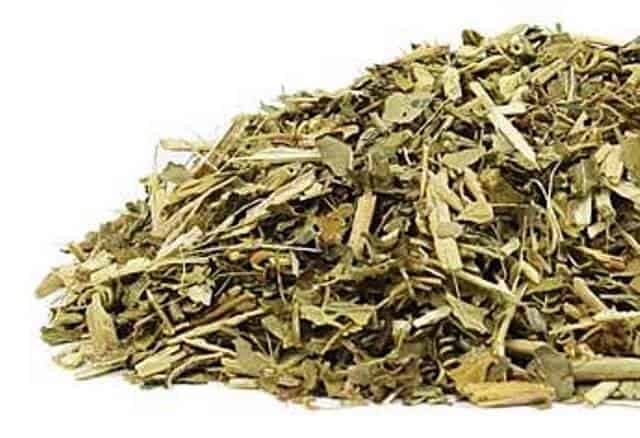
It is the golden seal root that is used in natural herbal remedies made from this plant. There are many benefits of goldenseal root, and it has a powerful antiseptic and anti-microbial action, as well as being one of the antiviral herbs.
This herb will help your allergies by aiding symptoms of seasonal allergies, and it is one of the natural herbal remedies that will help with boosting immune system function.
16. Marshmallow Root
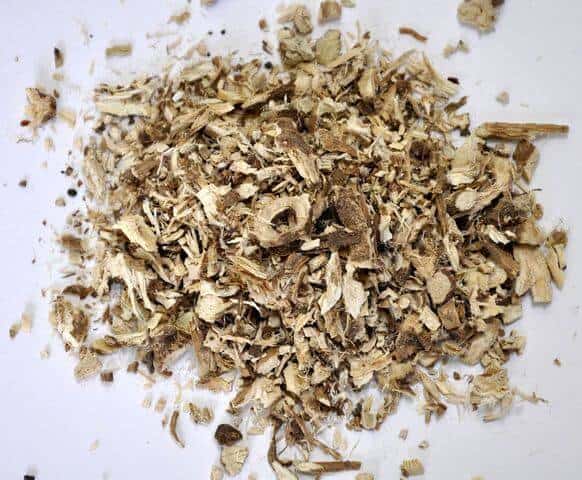
Marshmallow Root
In addition to pain-easing properties, Marshmallow root soothes, lubricates, softens and heals. Marshmallow root also contains tannins found effective against bacteria found in urinary tract infections. Marshmallow root can be taken internally as a tea.
17. Usnea (Usnea Barbata)

Usnea (Usnea barbata)
This common lichen is antibacterial and antifungal. A powerful antibiotic, usnea is used to treat urinary tract infections, strep and staph infections, respiratory and sinus infections as well as fungal infections like yeast and vaginosis.
Usnea is best used as a tincture. No known precautions, but consult a herbalist before using in pregnancy.
18. Uva Ursi (Arctostaphylos Uva-Ursi)

Uva Ursi is often used as a tincture or capsule for treating urinary tract infections as it contains compounds effective at killing pathogens typically associated with UTIs.
Because of its strength, it should not be used continually for longer than two weeks. Not for use by children, pregnant or nursing women or those with kidney disease.
19. Yarrow (Achillea Millefolium)

Tiny yarrow flowers have some different uses. As a powder, they stop bleeding quickly. Infused in water, it speeds the healing of canker sores.
As a tea, yarrow is used to fight urinary tract infections. Because it can cause uterine contractions, avoid during pregnancy.
20. Lemon Balm (Melissa Officinalis)
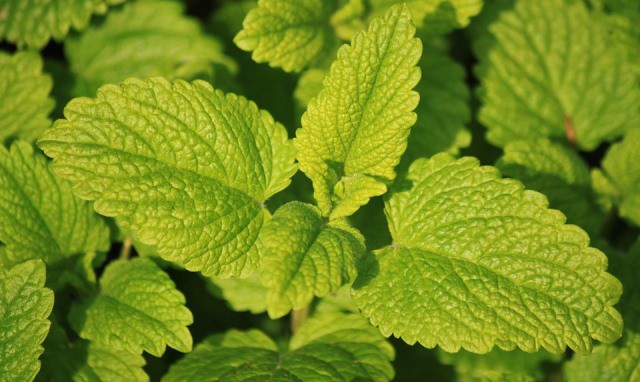
In Germany, the antiviral effects of lemon balm are well-documented, and creams made from the herb are prescribed for herpes outbreaks and cold sores. Lemon balm is very easy to grow in your garden – a little too easy, in fact, as it tends to take over if not contained.
Lemon balm makes a very good tea, and can be drunk to combat all sorts of viral infections, such as colds and flu. The tea or cream can be applied to cold sores or other viral lesions, such as shingles or chickenpox. May be unsafe to consume during pregnancy.
How To Use Antiviral Herbs?
1. Tea
Teas are a great way to get the antiviral benefits of herbs every day. Steep one tablespoon of herbs in hot water for 5–10 minutes. Ginger, for example, is great in an herbal tea after dinner.
It aids digestion and fights viruses. Echinacea, for example, is a popular herbal tea that’s sold in most food stores, so the work is already done for you.
2. Infusion
Herbal infusions are stronger than teas because they require a larger quantity of herbs. To make your herbal infusion, steep a cup of antiviral herbs in water for about 7 hours.
Keep the infusion in an air-tight jar, and drink it cold or heated. Because the infusions are strong, don’t drink more than one cup a day.
DIY Herbal-Infused Oil
An infused oil is when you heat the herb in a carrier oil for several hours. You can use the oven to heat the mixture, or try leaving it in a hot and sunny place for 12 hours.
Use about 1/2 cup of antiviral herbs (you can use one herb or a mixture), and add it to 1 cup of coconut or jojoba oil.
If you heat the mixture in the oven, it should be in an oven-safe dish for 3 hours at 200 degrees.
If you decide not to use the oven, put the mixture in an air-tight jar and let it sit in a sunny place for about 12 hours.
Once the herbs are infused into the oil, drain the leaves and keep the oil in a jar. You can use the oil topically to alleviate pain and kill infections.
3. Essential Oils
Many of these herbs are sold as essential oils; make sure to purchase organic and pure essential oils from a reputable company.
To use essential oils benefits like their antiviral properties, diffuse 3–5 drops in your home, add 2–3 drops to warm bath water or mix 1–2 drops with a carrier oil and apply the mixture directly to the skin.
Massaging essential oils into your feet, abdomen and chest are useful when fighting a fever or flu symptoms.
Don’t miss an opportunity to add these powerful antiviral herbs to your diet. They can be thrown onto so many meals throughout the day, and it’s worth it!

